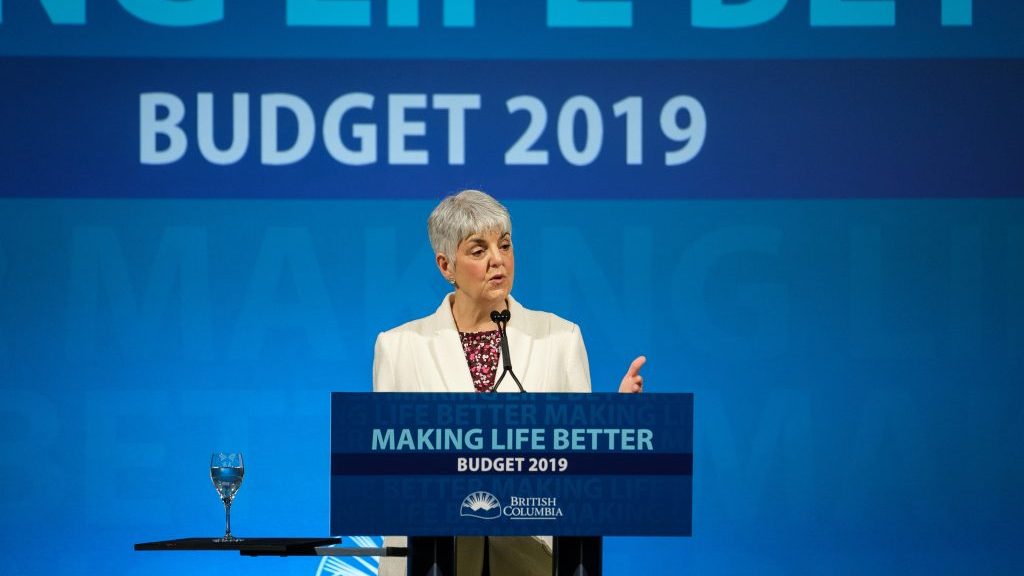B.C.’s 2019 budget, announced earlier this month by Finance Minister Carole James, has drawn mixed reviews from construction leaders.
One of the budget’s key features is $20.1 billion in taxpayer-supported capital spending for health and education infrastructure.
BC Building Trades executive director Tom Sigurdson said the investments will a boon for investment, training and jobs.
Approximately $4.4 billion will go towards the redevelopment of the Royal Columbian Hospital in New Westminster, a new patient-care tower at the Royal Inland Hospital in Kamloops and a new St. Paul’s Hospital at the Station Street site in Vancouver.
The government has set aside $6.6 billion is for priority projects, such as the Pattullo Bridge replacement, the Broadway subway, four-laning on Highway 1 through Kicking Horse Canyon and the replacement of Bruhn Bridge in Sicamous.
Roughly $2.7 billion will be spent on education facilities, including kindergarten to Grade 12 facilities, such as a new Northeast Elementary school in Fort St. John, a new school in Kelowna and the expansion of schools for Sullivan Heights Secondary in Surrey and Royal Bay Secondary in the Sooke school district.
Post-secondary institutions will see $3.3 billion to increase capacity for high-demand fields. This includes building a new sustainable energy engineering building at Simon Fraser University in Surrey, a new health sciences centre at Camosun College in Victoria and a renewed and expanded trades training facility at Selkirk College in Nelson.
The Building Trades explained they were “cautiously optimistic” regarding the province’s $3 million investment in the Industry Training Authority over three years. Officials intend to increase hands-on support for apprentices, employers and Indigenous communities to “engage with and navigate through the trades training system.”
The overall picture is an economy that is starting to show signs of decline
— Jordan Bateman
Independent Contractors and Businesses Association
The fund will also support the development of a performance management framework towards the inclusion of Indigenous people, women and other equity-seeking groups.
“We obviously need more details, but I hope we’re seeing the beginning of a restoration of support services for apprentices,” said Sigurdson in a release. “Prior to the Liberal government’s dismantling of the apprenticeship system, apprentices were guided by trained counsellors, from apprentice-level to journey-level qualification.”
Sigurdson also praised the $14 million to overhaul the Employment Standards Branch and deliver the Temporary Foreign Worker Protection Act. He stated this will create a registry of licensed foreign workers, with the aim to help protect vulnerable workers from exploitation.
“We hope this signals the end of the controversial self-help kit, which required complainants to essentially beg their employer to pay them their basic entitlements under the act,” said Sigurdson. “Ultimately, we’d like to see restoration of the Joint Compliance Teams to fight the underground economy that’s already costing B.C. taxpayers over $100 million a year in unpaid taxes and premiums primarily in residential construction.”
The Independent Contractors and Businesses Association (ICBA) saw the budget as a sign of trouble ahead.
“The overall picture is an economy that is starting to show signs of decline,” said Jordan Bateman, ICBA’s VP of communications.
He explained housing starts dropped 6.4 per cent in 2018 and are projected to drop another 16.7 per cent this year.
Projections show they will fall almost one-third from 43,664 in 2017 to 30,517 in 2021.
“This is the warning signal on the dashboard,” said Bateman. “Some of the problem is NDP policy, municipal red tape, loss of consumer confidence. Some is federal government market intervention — the bottom line is housing starts starting to fall is generally the first sign that the economy is heading into a downturn. That should be of grave concern to the finance minister but she just breezed by it.”
Bateman said he also found it difficult to believe the province’s projections that it would be able to eliminate hundreds of millions of dollars in deficits.
“If they do, it will be on the backs of huge rate hikes which is not good for small businesses,” he said.
Bateman said the finance minister noted it was taking a long time to get promised modular housing built but failed to recognize the province’s role in eliminating red tape for projects.
“It shows the mental disconnect the NDP caucus has around issues of housing,” Bateman said. “It’s frustrating to us, because if the province is having trouble getting something built imagine joe developer. They just put their head in the sand and refuse to do anything.”
The ICBA also was wary of the province’s $20-million investment to fund an independent oversight body in the mining sector. Bateman called it a new level of red tape for mining projects, which will stifle investment in that sector.
“It was surprising to see a government that has run out of ideas,” said Bateman. “It was mostly re-announcements and pronouncements. There is a real lack of any of the kinds of things that would help small businesses.”
The Progressive Contractors Association of Canada (PCA) also expressed deep concern over the budget.
The Budget 2019 forecast for B.C. showed real GDP growth has increased from 1.8 per cent to 2.4 per cent in 2019 and from 2.0 per cent to 2.3 per cent in 2020, compared to the First Quarterly Report 2018, with growth rates of 2.1 per cent expected in 2021 and 2.0 per cent in both 2022 and 2023. The province noted these changes partly reflect recent developments regarding the Canada United States Mexico Agreement and the final investment decision on the LNG Canada project, the single largest private sector investment in Canadian history.
However, PCA’s Western Canada director of stakeholder relations Rieghardt van Enter, noted the importance placed on a single LNG project for the economy is concerning.
“Other than that, they are not doing a whole lot else to attract investment in the province,” van Enter said. “They didn’t say anything else about keeping our economy strong. We are worried about bumps in the road with a major project like that. What will be left to pick up the pieces?”
Van Enter is also concerned about the province’s lacklustre housing starts.
“Our housing starts are down tremendously,” he said. “This is what the government wanted, but the construction industry is the unsung hero of the market and it’s keeping a lot of doors open and boards afloat. If the housing market cools, it’s going to be up to other projects to keep things going, and I’m not sure if we have done enough to promote that investment in our province.”
The PCA also was unimpressed with the province’s $20.1 billion in infrastructure investment as it will be delivered through the Community Benefits Agreement (CBA) framework.
In a statement, PCA president Paul de Jong said the CBA gives a monopoly to Building Trades Unions on public infrastructure projects and excludes non-union workers and progressive unions unless they join the Building Trades.
“We’ve been very vocal that the province’s CBA framework violates workers’ rights and greatly increases costs,” said de Jong. “It reduces the ability of the vast majority of B.C. construction companies to bid on projects, even though they employ 85 per cent of B.C.’s skilled tradespeople. We are starting to see CBA language included on more projects, further compromising the stability of the construction industry in B.C. and adding huge, unnecessary costs to taxpayers. It really is money well wasted.”











Recent Comments
comments for this post are closed